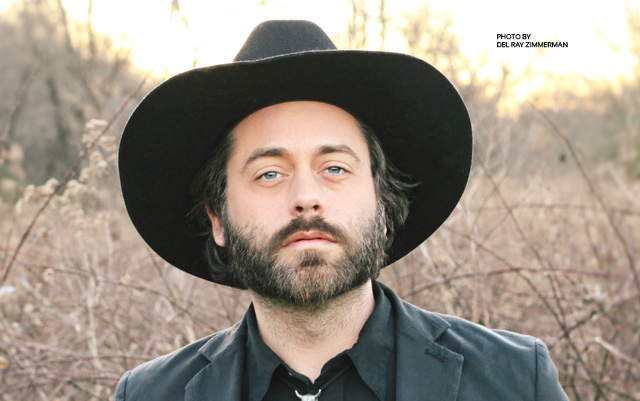BY TIMOTHY LARCOMBE
Indiana Queen Kicks Up The Boots and Saddles in ‘Summon Without Sorrow’
Kevin Thornton, the lead singer of the queer country band Indiana Queen, grew up as a fundamentalist Christian.
It was the late ’80s, early ’90s, in small town Indiana, and his whole world revolved around church. There was nothing else really, except Denny’s, where, after Bible lesson, he and his buddies would hang out until curfew. He was charismatic, and his pastors saw that. By 15, Thornton was delivering sermons in front of a megachurch congregation.
So, when his hormones kicked in and Thornton realized he was gay, it made for some rather conflicted and torturous late teen years. He says going away to college saved his life. “I had never been around so many liberal people who couldn’t care less that I was gay,” he says. “I didn’t even know it was an option before.”
Indiana Queen’s latest album, “Summon Without Sorrow,” and its accompanying film are a visceral journey into music through Thornton’s eyes. It combines spiritual references with modern dance and homoerotic elements that together deliver a powerful message of pride, love and acceptance.
What inspired “Summon Without Sorrow”?
Fans of Indiana Queen have always appreciated the visual imagery of our music videos. This time around, I wanted to take the visuals as far as I could. I decided to present the entire album as a film.
Is there significance behind the title?
There’s a theme throughout of looking back at a painful past and coming to terms with it. It essentially means “summoning up the ghosts from the past and remembering it all without the pain and sadness.” Today, I look back with reverence at the experiences that helped shape me into who I am.
Like growing up fundamentalist Christian?
My favorite song on the album is “This Is How It Goes,” because it is the most vulnerable. It’s about remembering when I was young, when my whole world was the church, and falling for a guy. There was a lot of repressed sexual tension between us. We were so afraid. The song is about looking back, remembering him, and wondering if he made it out of that hell like I did.
Did anything physical happen between you two?
We were teenagers, so not much. There were some shame-filled, post-church hand jobs.
Has your family come around to accepting your homosexuality?
Oh, yes. My immediate family has become quite liberal.
Have they heard and seen the album and film?
Not yet, but they’ll be just fine with the album. All the nudity and man-kissing in the film might be a bit much for them. Although, my family usually surprises me.
Why did you pack the film with fetish instead of scenes on the ranch that we typically see in country music videos?
[laughs] Do we need any more country videos with scenes of ranches and wheat fields? I’d rather explore different spaces and textures. I’m more interested in being subversive than sanitary. It’s provocative imagery. I also like the juxtaposition of pairing folk and country music with beefy guys in leather, kissing each other. Or maybe it’s just an excuse for me to get beefy guys in leather to make out in front of me.
My favorite track is “Nashville Don’t Give a Damn.”
I’ve had an on-again, off-again love affair with Nashville for two decades. There were times where I felt like hot shit in this town. Then lots of other times where it felt like she didn’t even know my name. That’s how it goes, I guess. The song comes from an empowered place. Nashville doesn’t give a damn. That’s true. I’ve decided to forge ahead anyway.
What does the northern LGBTQ community need to know about gay life in the South?
Rural communities are still quite opposed to queer people. I sometimes feel like I still need to look over my shoulder to see who’s watching. But the world is changing fast, even here in the South. Luckily, Nashville, where I am now, is a pretty progressive village, and it’s quite easy to live here.

